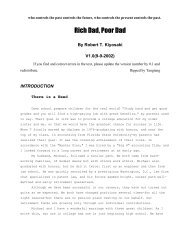Rich Dad, Poor Dad
Create successful ePaper yourself
Turn your PDF publications into a flip-book with our unique Google optimized e-Paper software.
who controls the past controls the future, who controls the present controls the past.<br />
So when genuine "deals of a lifetime" come along, those same people cannot<br />
take advantage of the opportunity. They must play it safe, simply because they<br />
are working so hard, are taxed to the max, and are loaded with debt.<br />
As I said at the start of this section, the most important rule is to know<br />
the difference between an asset and a liability. Once you understand the<br />
difference, concentrate your efforts on only buying income-generating assets.<br />
That's the best way to get started on a path to becoming rich. Keep doing that,<br />
and your asset column will grow. Focus on keeping liabilities and expenses down.<br />
This will make more money available to continue pouring into the asset column.<br />
Soon, the asset base will be so deep that you can afford to look at more<br />
speculative investments. Investments that may have returns of 100 percent to<br />
infinity. Investments that for $5,000 are soon turned into $1 million or more.<br />
Investments that the middle class calls "too risky." The investment is not risky.<br />
It's the lack of simple financial intelligence, beginning with financial<br />
literacy, that causes the individual to be "too risky,"<br />
If you do what the masses do, you get the following picture.<br />
Income = Work for Owner<br />
Expense = Work for Government<br />
Asset = (none)<br />
Liability = Work for Bank<br />
As an employee who is also a homeowner, your working efforts are generally<br />
as follows:<br />
1. You work for someone else. Most people, working for a paycheck, are<br />
making the owner, or the shareholders richer. Your efforts and success will help<br />
provide for the owner's success and retirement.<br />
2. You work for the government. The government takes its share from your<br />
paycheck before you even see it. By working harder, you simply increase the<br />
amount of taxes taken by the government - most people work from January to May<br />
just for the government.<br />
3. You work for the bank. After taxes, your next largest expense is<br />
usually your mortgage and credit card debt.<br />
The problem with simply working harder is that each of these three levels<br />
takes a greater share of your increased efforts. You need to learn how to have<br />
your increased efforts benefit you and your family directly.




